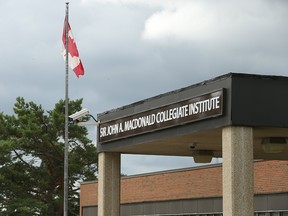The TDSB — the largest public school board in Canada — embarked upon a proactive review of the names of all schools under its purview

The Toronto District School Board (TDSB) will change the names of three public schools commemorating Henry Dundas, Egerton Ryerson and Sir John A Macdonald.
In October 2024, the TDSB — the largest public school board in Canada — embarked upon a proactive review of the names of all schools under its purview.
So far, three schools have come up: Dundas Junior Public School, named after the 18th-century politician, Ryerson Community School, named after the 19th-century Methodist minister, and Sir John A Macdonald Collegiate Institute, named after Canada’s first prime minister.
The proposed name changes come after years of controversy and political wrangling over the names of everything from universities to LRT stations to public schools, institutions often named after major figures in Commonwealth or Canadian history who have since become controversial.
Patrice Dutil, a professor in the department of politics and public administration at Toronto Metropolitan University, called for a “moratorium” on renaming schools, colleges and universities.
“These renaming vendettas are based on cheap hearsay and educators — especially educators — owe it to the population that elects them to consult the historical record and make better decisions. The TDSB is not doing its homework, and the provincial government should be calling it to order,” said Dutil, who recently published a book on Macdonald.
Dundas, Ryerson and Macdonald have all been subjected to debate among historians and activists, not just about their legacies, but whether they should still be celebrated. It’s a debate that, at times, has gone beyond the faculty club or the pages of academic journals and ended with the vandalism of statues.
Lynn McDonald, a former member of Parliament and fellow of the Royal Historical Society, said in an interview that historical errors — notably in the case of Ryerson, she said — were the reasons given for name changes.
“If there were a good reason to change the name, they should. They should say that, but that’s not what they say. They give false accusations as the reason for changing those names,” McDonald said.
There are villains on residential schools, but neither Ryerson or Macdonald are among them
On Monday, the board’s policy and governance committee recommended that the schools’ names be changed, and referred the decision to the full board. James Cowan, who’s on the advisory board of the Canadian Institute for Historical Education and sits on the board of directors of Canada’s History, said decisions made by school boards can lead to children being “misinformed” and “indoctrinated.”
“What’s so egregious about it is this is an organization that oversees our education system, and so if you would expect any group in society to be interested in facts and accuracy, you would expect the people that we’re trusting to educate our children,” Cowan said.
“There are villains on residential schools, but neither Ryerson or Macdonald are among them,” wrote McDonald in an email.
The TDSB, in its staff report, argues that changing the names of schools is consistent with the Truth and Reconciliation Commission’s Calls to Action and that for minority students, attending schools “commemorating individuals who had an explicit role in perpetuating their community’s cultural genocide or other types of systemic violence, such as sexual and gender-based violence and religious persecution serves as a potentially harmful microaggression.”
Sean Carleton, a historian and Indigenous studies scholar at the University of Manitoba, argues that the purpose of history is to learn from the past, and not simply lionize those from our history.
“In this moment, what people are doing (is), with new information reevaluating the symbols that we choose in society to, convey our values,” said Carleton in an interview. “Many people are saying, ‘Can we not do better than naming a school after someone who advocated for a system of genocidal schooling?’”
If Canadians have these debates, Carleton argued, it could be something we could be proud of.
“The process of having that debate is actually healthy, as long as the people engaged in it are learning from the past and engaging meaningfully in that dialogue, rather than just trying to push the politics of like, you know, ‘Macdonald is a monster,’ or ‘Macdonald is a saint,’” Carleton said.
Renaming, however, has been criticized by some historians.
Margaret MacMillan, an emeritus professor of history at the University of Toronto, has argued that the past cannot be changed by removing names.
Several other school boards have previously removed names from schools. In 2021, the York Region District School Board voted to change the name of an elementary school in Markham, Ont., that was named after Macdonald. It’s now called Nokiidaa Public School. Nokiidaa is the Ojibwe word meaning “let’s work” or “let’s all work together.”
In Ottawa, the National Capital Commission, which oversees federal lands in the National Capital Region, renamed the Sir John A. Macdonald Parkway to Kichi Zībī Mīkan, which means “Ottawa River path.”
Our website is the place for the latest breaking news, exclusive scoops, longreads and provocative commentary. Please bookmark nationalpost.com and sign up for our daily newsletter, Posted, here.